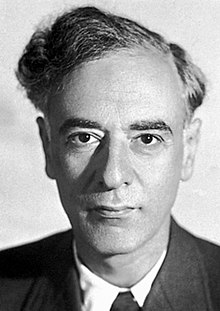Lev Davidovich Landau (Russian: Лев Дави́дович Ланда́у; 22 January 1908 – 1 April 1968) was a Soviet physicist who made fundamental contributions to many areas of theoretical physics.[1][2][3] He was considered as one of the last scientists who were universally well-versed and made seminal contributions to all branches of physics.
His accomplishments include the independent co-discovery of the density matrix method[4][5] in quantum mechanics (alongside John von Neumann), the quantum mechanical theory of diamagnetism, the theory of superfluidity, the theory of second-order phase transitions, invention of order parameter technique,[6] the Ginzburg–Landau theory of superconductivity, the theory of Fermi liquids, the explanation of Landau damping in plasma physics, the Landau pole in quantum electrodynamics, the two-component theory of neutrinos, and Landau's equations for S-matrix singularities.[7] He received the 1962 Nobel Prize in Physics for his development of a mathematical theory of superfluidity that accounts for the properties of liquid helium II at a temperature below 2.17 K (−270.98 °C).[8]
- ^ McCauley, Martin (1997). Who's Who in Russia Since 1900. Routledge. p. 128.
Landau, Lev Davydovich (1908-68), a brilliant Soviet theoretical physicist, who was born into a Jewish family in Baku and graduated from Leningrad State University in 1927.
- ^ Zubok, Vladislav (2012). "Soviet Intellectuals after Stalin's Death and Their Visions of the Cold War's End". In Bozo, Frédéric; Rey, Marie-Pierre; Rother, Bernd; Ludlow, N. Piers (eds.). Visions of the End of the Cold War in Europe, 1945-1990. Berghahn Books. p. 78.
- ^ Cite error: The named reference
ScientificAmerican1997was invoked but never defined (see the help page). - ^ Lev Landau (1927). "Das Dämpfungsproblem in der Wellenmechanik (The Damping Problem in Wave Mechanics)". Zeitschrift für Physik. 45 (5–6): 430–441. Bibcode:1927ZPhy...45..430L. doi:10.1007/bf01343064. S2CID 125732617. English translation reprinted in: D. Ter Haar, ed. (1965). Collected papers of L.D. Landau. Oxford: Pergamon Press.
- ^ Schlüter, Michael; Lu Jeu Sham (1982). "Density functional theory". Physics Today. 35 (2): 36. Bibcode:1982PhT....35b..36S. doi:10.1063/1.2914933. S2CID 126232754. Archived from the original on 15 April 2013.
- ^ Fisher, Michael E. (1 April 1998). "Renormalization group theory: Its basis and formulation in statistical physics". Reviews of Modern Physics. 70 (2): 653–681. Bibcode:1998RvMP...70..653F. doi:10.1103/RevModPhys.70.653.
- ^ Shifman, M., ed. (2013). Under the Spell of Landau: When Theoretical Physics was Shaping Destinies. World Scientific. doi:10.1142/8641. ISBN 978-981-4436-56-4.
- ^ Kapitza, P. L.; Lifshitz, E. M. (1969). "Lev Davydovitch Landau 1908–1968". Biographical Memoirs of Fellows of the Royal Society. 15: 140–158. doi:10.1098/rsbm.1969.0007.
